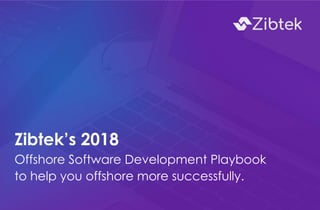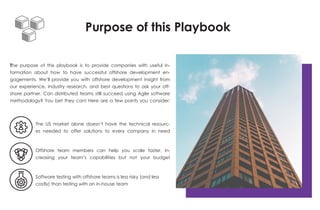Offshore Software Development Playbook
- 1. ZibtekŌĆÖs 2018 Offshore Software Development Playbook to help you offshore more successfully.
- 2. Purpose of this Playbook The purpose of this playbook is to provide companies with useful in- formation about how to have successful offshore development en- gagements. WeŌĆÖll provide you with offshore development insight from our experience, industry research, and best questions to ask your off- shore partner. Can distributed teams still succeed using Agile software methodology? You bet they can! Here are a few points you consider: The US market alone doesnŌĆÖt have the technical resourc- es needed to offer solutions to every company in need Offshore team members can help you scale faster, in- creasing your teamŌĆÖs capabilities but not your budget Software testing with offshore teams is less risky (and less costly) than testing with an in-house team
- 3. Contents 01 02 03 0405 06 07 Letter from the CEO Analyze the talent pools Overcome language & cultural barriers Freelance vs Full-time teams Ensuring your IP is secure Get started with offshore development
- 4. A Letter from CEO I have a passion for building software and bringing new ideas to the table. This passion has driven mefromthebeginningofmycareerandcarriesintoourclientprojectshereatZibtek.Ihavebeen building software products for 18 years with both onshore and offshore teams. I have worked with teams Internationally from Russia, China, Ukraine, Costa Rica and India. I have garnered lifelong relationships with software engineers all over the world. Given that only 19% of software developers are US-based, nearly every company adopts offshore development at some point. WeŌĆÖve created this playbook to help highlight some of our learnings from our combined experiences in offshore software development. Continuing to learnfrom our successes and mistakes is our ultimate goal. We promise to share our learnings with you as we continue to hone our skills and find new ways of doing things. I hope you enjoy the 2018 Offshore Software Development Playbook anwould love your feedback Cache Merrill CEO, Zibtek Cache Merrill CEO, Zibtek
- 5. Analyze the talent Pools One important thing to consider when determining an international software development partner, is the size of the talent pool in their region. Are there enough rockstar developerstosupportyourcompanyŌĆÖs softwaredevelopmentandscalabilityneeds?Ifnot, you may find yourself managing multiple entities (as if building a business isnŌĆÖt hard enough!) Gartner Inc. ranks the top 30 countries for offshore software development, and breaks them into 3 regions: 01 02 03 The Americas The AmericasThe Americas Asia Pacific Europe & the Middle East M├®xico, Chile, Brazil, Costa Rica, Argentina, Columbia, Peru and Panama Bangladesh, China, India, Indo- nesia, Malaysia, the Philippines, Sri Lanka, Thailand and Vietnam. Bulgaria, The Czech Republic, Egypt, Hungary, Mauritius, Mo- rocco, Poland,Romania, Russia, Slovakia, South Africa, Turkey and Ukraine. Of these top 30 countries, China and India have the largest population of web de- velopers, with 1.8 and 1.7 million respectively. This should come as no surprise, as they are the two most populated countries in the world. There are roughly 18 million web developers in the world, with the United states housing 19% of the market (3.4 mil- lion.) Nearly 90% of the remaining 14.6 million developers reside in GartnerŌĆÖs top 30.
- 6. Overcome Language and Cultural Barriers Selecting an offshore partner means that more than likely, there will be both language and cultural differences. But donŌĆÖt let that scare you away! Whiletheremaybedifferencesintermsofhowbusinessisconducted,thereareseveralstepsyou can take to overcome potential communication or cultural barriers. When choosing a market to outsource development to, make sure that adapting to your way of business is something that they are not only comfortable, but also familiar with. Simple things like project deadlines and updates can be incredibly painful if you are working with a partner that doesnŌĆÖt understand how youŌĆÖd like to conduct business.
- 7. Overcome Language and Cultural Barriers Of the Gartner top 30 countries for offshore software development, sever- al have significant populations of English speakers. Most notably are India (125m), The Philippines (64m), Bangladesh(30m) (30m) and Egypt (28m.) While English is becoming increasingly common in tech circles, it is also vital to assess the cultural differences that may arise when working with an offshore tech team. Many countries have long-standing friendly relations with the United States and workers are accustomed to adapting to the US way of doing business. Notable examples include Thailand (a well known tourist hub and strong economy,) India (long history of tech support out- sourcing,) and Mexico due to itŌĆÖs neighbor status with the United States.
- 8. Freelance VS Full Time Teams There are several options when it come to outsourced development. You can hire a freelancer from Craigslist, use a freelance staffing agency, or hire a full-time offshore development team. WeŌĆÖll help you weigh the options to find your projectŌĆÖs best fit. Freelance implies project-based contract work. While there are some benefits, including the potential for slightly lower costs, freelance developers typically take on projects to supplement other income, meaning you donŌĆÖt get their full aention. Freelance projects are usually based on timeline, so if you need to scale a team, it can be a logistical nightmare. Offshoring with a full-time team is usually a safer option, as the employees are just that, employees. They have managers, are paid a salary, and are held accountable for their work product by someone other than you. Logistical problems associated with organizing several freelancers no longer exist, as team members oen work in the same space as one another, making collaboration much easier and Agile development a natural fit. Not all offshore development is created equal. The terms ŌĆ£freelanceŌĆØ and ŌĆ£outsourcedŌĆØ should not be used interchangeably. Disclaimer:
- 9. Ensuring Your IP is Secure Security questions To Ask A Potential Offshore Partner: 1 2 3 4 5 Who owns the equipment your company works on? Do employees work from a central location? Is your IT infrastructure up to industry standards? What physical security measures have you taken to ensure safety of your customersŌĆÖ IP? Are your developers contractors or full-time employees? It doesnŌĆÖt maer how smart an offshore team is if the work they are doing for you is not protected. Zibtek is a US-based offshore software development company with dozens of highly skilled developers in India. All Zibtek projects are managed by a U.S. native technical project lead to ensure that no language or cultural barriers exist. All employees work on company equipment, in a company office that has 24/7 on site security and adheres to the strictest IT security protocols.
- 10. Contact us For more information on how Zibtek can help your team USA Draper 12365 S 970 E, Draper UT 84020 hello@zibtek.com +1 (801) 895 2894 Bengaluru 651-5M, Rais Pinnacle, OMBR Layout hello@zibtek.com (080) 420-3776 INDIA PHILIPPINES Manila hello@zibtek.com BULGARIA Sofia hello@zibtek.com










